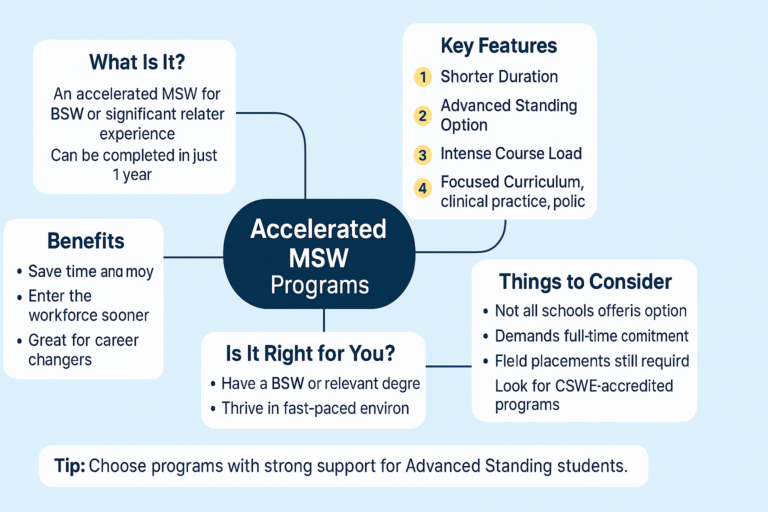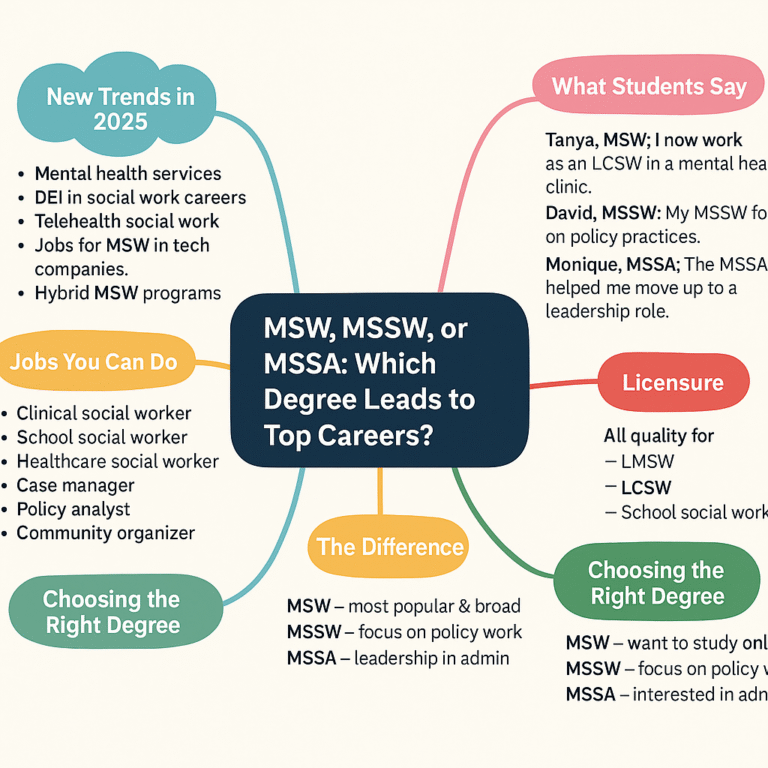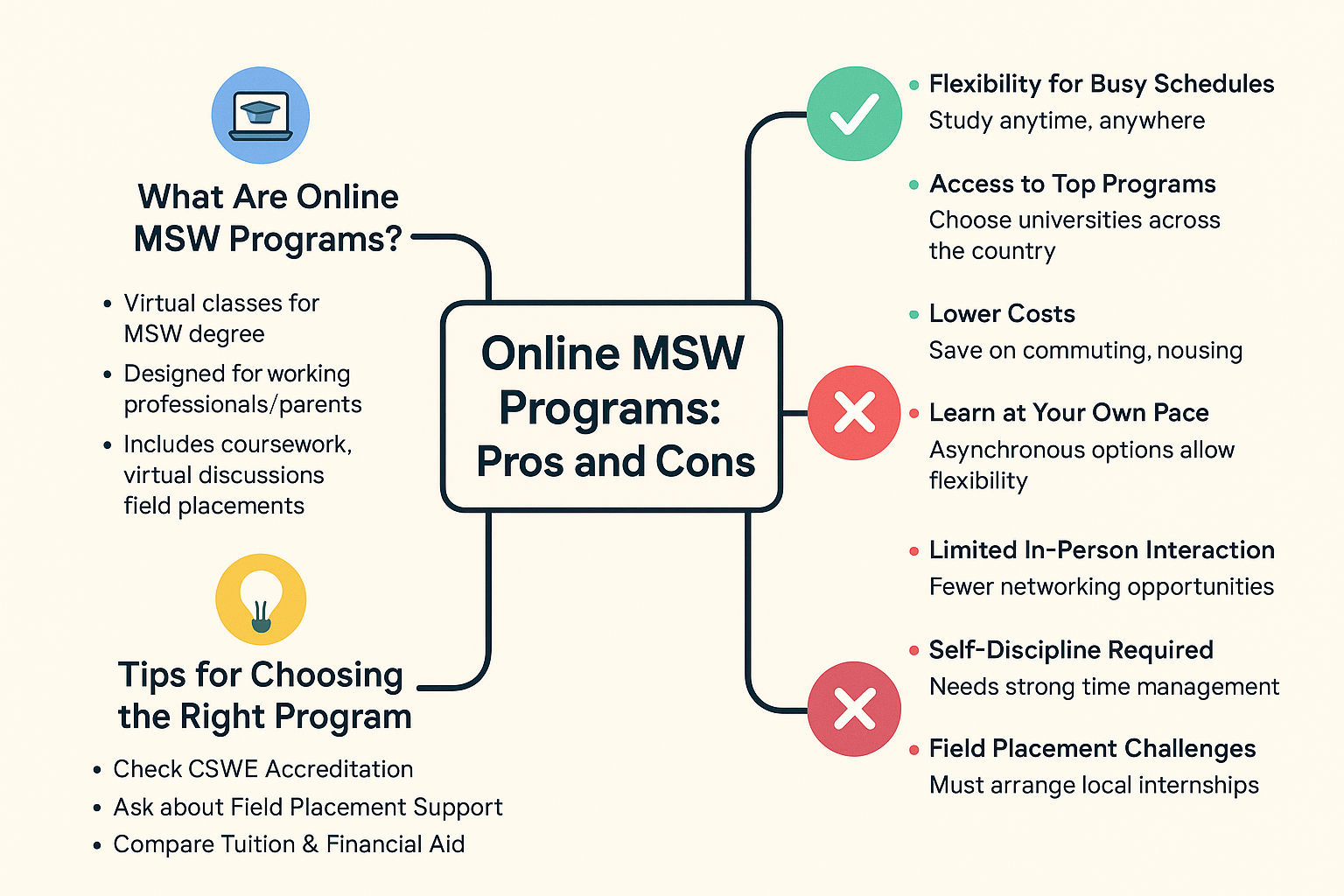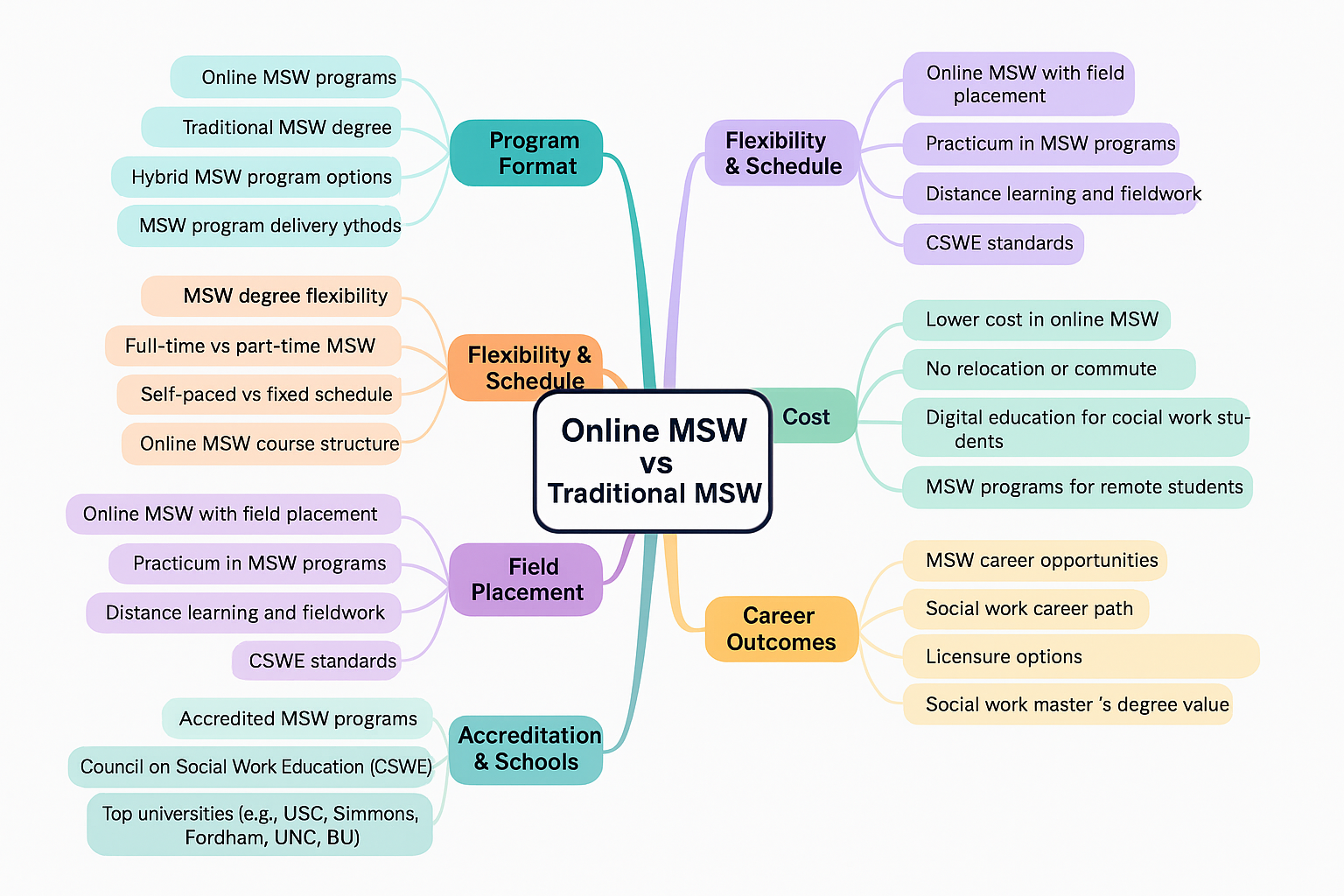MSW vs MSSW vs MSSA: Which Social Work Degree Is Right for You?
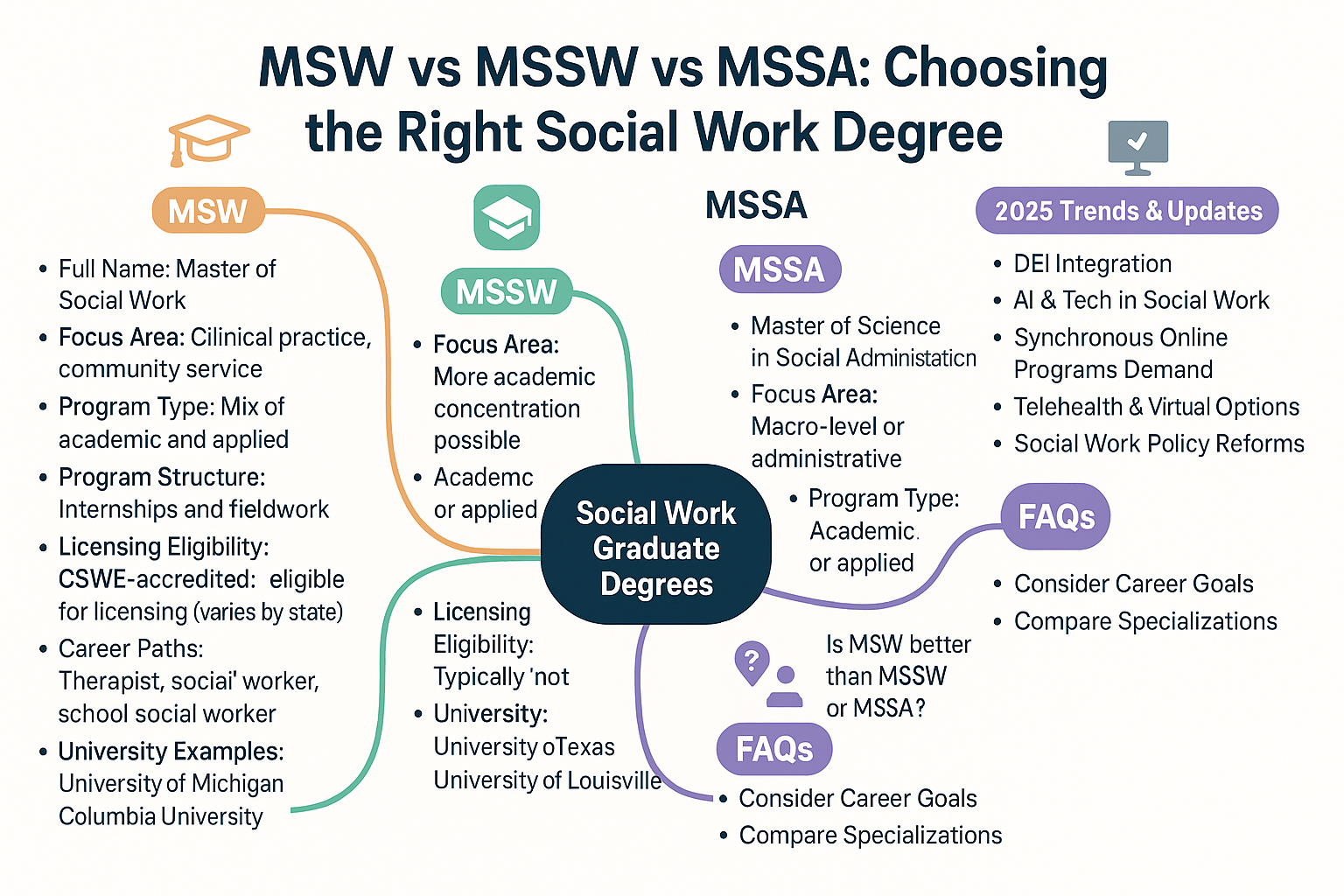
If you’re considering a career in social work, you’ve probably come across degree options like MSW, MSSW, and MSSA. These may seem confusing at first—but don’t worry. They all prepare you for a fulfilling future in helping others. So, what’s the difference between them? Let’s break it down in a simple, positive, and helpful way.
What Is the Difference Between MSW, MSSW, and MSSA Degrees?
All three degrees—MSW (Master of Social Work), MSSW (Master of Science in Social Work), and MSSA (Master of Science in Social Administration)—are graduate-level qualifications that prepare you for licensure and advanced social work roles.
- MSW is the most commonly recognized degree across the U.S.
- MSSW is more common in universities like the University of Texas.
- MSSA is unique to schools like Case Western Reserve University.
Despite the different names, they are generally equivalent in purpose and function.
What Is Each Program?
What Is the MSW?
The Master of Social Work (MSW) is a versatile degree accepted nationwide. It’s ideal if you want to become a Licensed Clinical Social Worker (LCSW), work in policy, or enter community organizations.
Key points:
- Prepares for licensure like LCSW
- Offers a broad range of specializations
- Available online or in-person
What Is MSSW?
The Master of Science in Social Work (MSSW) offers a research-based and science-focused approach to social work. While similar to the MSW, it might have a stronger emphasis on data, research, and evidence-based practices.
What’s unique!
- MSSW has a stronger emphasis on data, research, and evidence-based practices.
- Offered at select universities
If you’re worried about eligibility, check out how tough it is to get into MSW programs without a BSW.
What Is the MSSA?
The Master of Science in Social Administration (MSSA) is essentially an MSW by a different name. It is typically offered by Case Western Reserve
Why consider it?
- Focus on policy, leadership, and systems-level work
- Ideal for those interested in making big changes in communities
MSSW vs MSW vs MSSA: Pros and Cons
| Degree | Best For | Focus Area | Available Where? |
| MSW | Clinical or general practice | Balanced | Most U.S. schools |
| MSSW | Research and policy | Evidence-based practice | UT Austin, Louisville |
| MSSA | Leadership & systems | Administration | Case Western Reserve |
What Can You Do with Each Degree
Most programs offer:
- Clinical or Direct Practice
- Macro Social Work (policy, administration, community leadership)
- Medical Social Work
- School Social Work
- Gerontology
- Substance Use and Mental Health
All three open doors to similar career paths. What matters most is your school, specialization, and state licensure.
Not sure if you’re a macro or micro social worker? Read our guide on Choosing Macro vs Micro Social Work to find your path.
Choosing Your Specialization: How to Find the Path That’s Right for You
Choose a track based on your passion.
- Want to help people 1-on-1? Go clinical.
- Prefer systemic change? Choose macro.
- Love working in schools or hospitals? Choose a specific setting.
Suggested: Top Jobs After MSW, MSSW, or MSSA: Find Your Best Career Path
What Kinds of Courses Are Offered in Each Program?
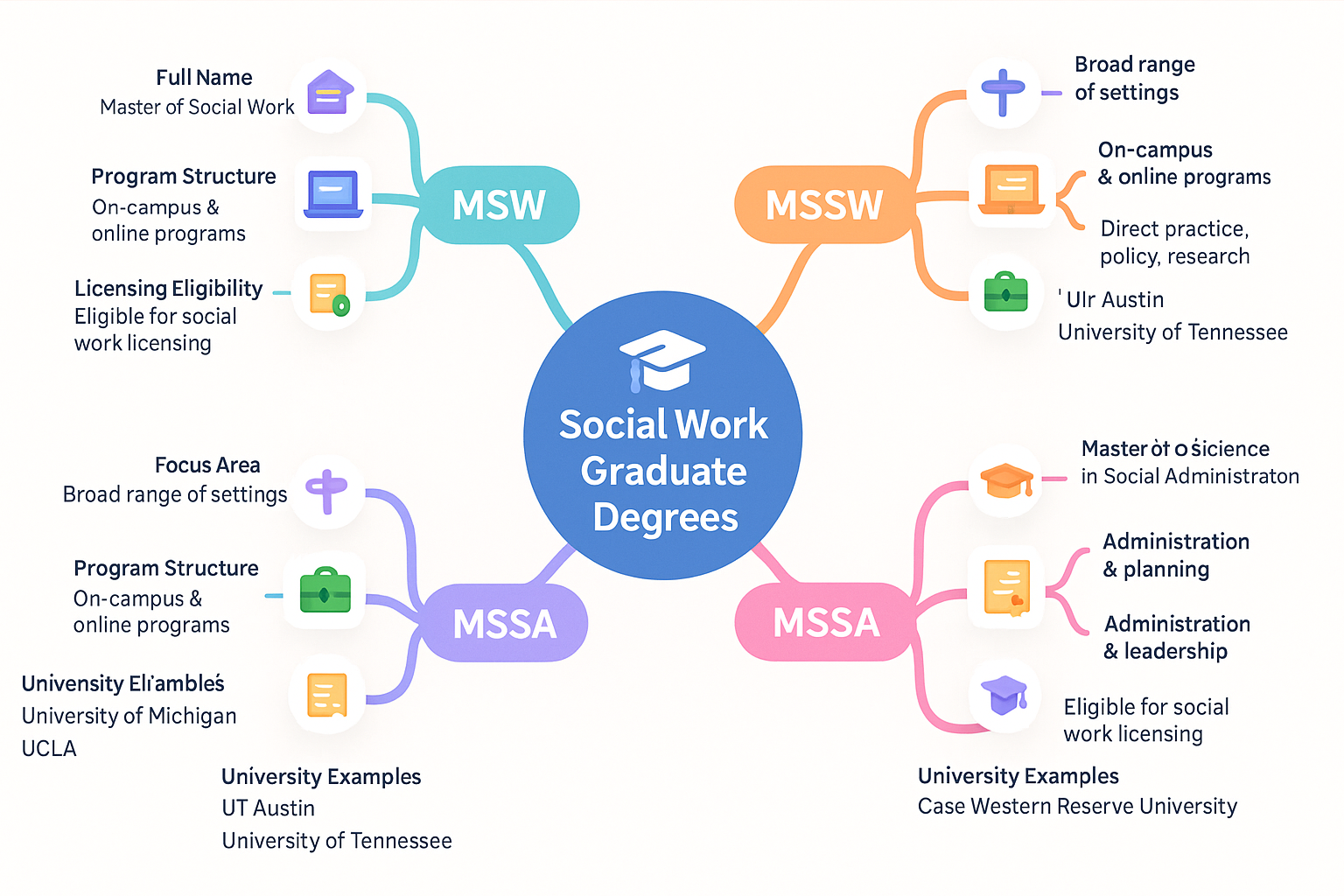
Key Course Topics You’ll Learn in Each Program
Each program teaches:
- Human behavior and social environments
- Ethics in social work
- Cultural competence
- Field placement (hands-on learning)
Want a deeper dive into fieldwork? Explore our post on Social Work Field Placements for real-world insights.
Some schools may add courses in:
- Trauma-informed care
- School social work
- Addiction services
- Mental health therapy
Similarities Between MSW and MSSW
- Accreditation through CSWE
- Eligibility for licensure
- Similar core curriculum
- Required field placements
Admissions Requirements
Typically:
- Bachelor’s degree (BSW preferred but not required)
- Minimum GPA (often 3.0)
- Letters of recommendation
- Statement of purpose
Full-Time vs Part-Time Study Options
- Full-time: 2 years
- Advanced standing (with BSW): 12–18 months
- Part-time: 3–4 years
Interested in flexible learning? Explore Online vs Traditional MSW programs to find your ideal format.
Program Structure
- Classroom and fieldwork combo
- Cohort-based or flexible
- Specialization options
Still Not Sure Which Degree Fits You?
Consider your long-term career goals. If you’re leaning toward clinical therapy, go for the MSW. Interested in research or policy leadership? MSSW or MSSA may be better options.
Tip: Talk to alumni, review field placement opportunities, and explore course syllabi before deciding.
Graduation Requirements
- Field hours (usually 900–1200)
- Capstone or thesis project (optional)
Career Opportunities
- Medical or hospital social worker
- Mental health clinician
- School counselor
- Policy advocate
- Community program manager
MSW vs MSSW vs MSSA
| Feature | MSW | MSSW | MSSA |
| Full Name | Master of Social Work | Master of Science in Social Work | Master of Science in Social Administration |
| Focus Area | Clinical, community, and policy work | Research, science-based practice | Administration, leadership, policy |
| Commonly Offered At | Most U.S. universities | Select schools (e.g., UT Austin) | Case Western Reserve University |
| Accreditation | CSWE | CSWE | CSWE |
| Licensure Eligibility | Yes | Yes | Yes |
| Online Availability | Widely available | Growing availability | Limited |
| Recognition & Popularity | Highly recognized | Less recognized | Regionally recognized |
| Best For | Broad practice areas | Research & data-driven practice | Admin/Policy leadership role |
Differences Between MSW, MSSA and MSSW
While nearly identical in function:
- MSW is more widely recognized by name.
- MSSW may suggest a more research-focused or science-based curriculum.
- MSSA is unique to certain universities but equivalent in training.
Choosing the Right Degree Program
The Most Important Consideration
Pick the program that fits your career goals and offers strong field placement and faculty support.
Other Factors to Consider
- Location or online availability
- Cost and financial aid
- School’s reputation in social work
- Specializations that match your interests
Worried about tuition? Check out top 25 scholarships for social work students that can support your degree.
Latest Trends and Developments in MSSW (2025)
1. Emphasis on Mental Health and Substance Use Treatment
There is growing demand for social workers specializing in mental health and substance use. MSSW programs now include deeper training in behavioral health and trauma-informed care.
2. Focus on Aging Populations
As baby boomers age, gerontological social work is gaining popularity. MSSW courses now emphasize elder care, senior advocacy, and age-inclusive services.
3. Integration of Technology and AI
New MSSW curriculums are testing AI for simulations, automated documentation, and client case analysis. While still early, this trend shows strong promise for enhancing social work education.
4. Commitment to Diversity, Equity, and Inclusion (DEI)
MSSW programs increasingly address racial, gender, and socio-economic disparities. Cultural competency, anti-racism, and intersectionality are integrated across classes and fieldwork.
5. Expansion of Online and Flexible Learning Options
With more students needing flexible education, many MSSW programs now offer high-quality online tracks with virtual field placements and synchronous learning.
6.Employment Outlook and Opportunities
The U.S. Bureau of Labor Statistics projects 7% job growth for social workers from 2023 to 2033. Health care, education, and social justice sectors are hiring MSSW grads in large numbers.
7. MSSW Program Highlights
Top MSSW schools—like Columbia University and University of Texas—offer specialized training in clinical practice, research, and macro social work. Students benefit from hands-on field experience, mentorship, and leadership development.
8. Global Perspectives
Globally, the MSSW degree is becoming more relevant as countries invest in social support systems. European labor reports show growth in social services, increasing international mobility for MSSW graduates.
Final Thoughts
Whether you choose an MSW, MSSW, or MSSA, you’re stepping into a high-impact field. Stay ahead by choosing programs aligned with modern social challenges, tech integration, and DEI values. Your path in social work matters—and the future is bright.

